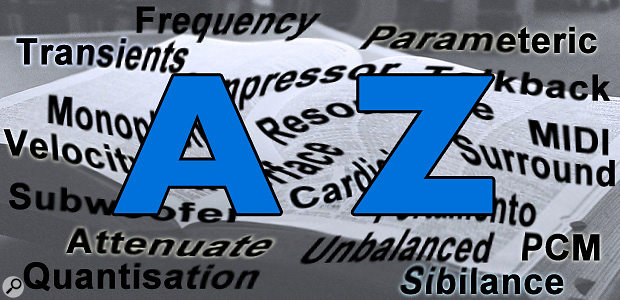You are here
Glossary
The amount by which a circuit amplifies a signal, normally denoted in decibels (dB).
The act of optimising the signal level through each audio device in a signal chain, or through each section of a mixing console, to maintain an appropriate amount of headroom and keep the signal well above the system noise floor.
Electrical isolation between two circuits. A transformer provides galvanic isolation because there is no direct electrical connection between the primary and secondary windings; the audio signal is passed via magnetic coupling. An opto-coupler also provides galvanic isolation, as the signal is passed via light modulation.
An electronic device (analogue or digital) designed to mute low level signals so as to improve noise performance during pauses in the wanted material. (See also 'Expander'.)
A synthesizer control signal generated whenever a key is depressed on an electronic keyboard and used to trigger envelope generators and other events that need to be synchronised to key action.
A universally agreed subset of the MIDI standard, created to enable manufacturers to build synthesizers, synth modules and plug-in instruments that exhibit an agreed minimum degree of compatibility.
Describes an unwanted short term corruption of a signal, or the unexplained, short term malfunction of a piece of equipment.
A universal SysEx (System Exclusive) command which activates the General MIDI mode on a GM instrument. The same command also resets all controllers to their default values and switches off any notes still playing by means of an All Notes Off message.
A flexible tube often used to support microphones or small lights. Sometimes also known as a 'Swan Neck'.
An form of equaliser whereby multiple narrow segments or bands of the audio spectrum are controlled by individual cut/boost faders. The name comes about because the fader positions provide a graphic representation of the EQ curve. The bandwidths of the filters are typically octave (10 faders) or 1/3 octave (31 faders).
An alternative term for the electrical Earth or 0 Volts reference. In mains wiring, the ground cable is often physically connected to the planet’s earth via a long conductive metal spike.
A condition created when two or more devices are interconnected in such a way that a loop is created in the ground circuit. This can result in audible hums or buzzes in analogue equipment, or unreliability and audio glitches in digital equipment. Typically, a ground loop is created when two devices are connected together using one or more screened audio cables, and both units are also plugged into the mains supply with safety ground connections via the mains plug earth pins. The loop exists between one mains plug, to the first device, through the audio cable screen to the second device, back to the mains supply via the second mains plug, and round to the first device via the building’s power wiring. If the two mains socket ground terminals happen to be at slightly different voltages (which is not unusual), an small current will flow around the ground loop. Although not dangerous, this can result in audible hums or buzzes in poorly designed equipment.
Ground loops can often be prevented by ensuring that the connected audio equipment is powered from a single mains socket or distribution board, thus minimising the loop. In extreme cases it may be necessary to disconnect the screen connection at one end of some of the audio cables, or to use audio-isolating transformers in the signal paths. The mains plug earth connection must NEVER be disconnected to try to resolve a ground loop problem as this will render the equipment potentially LETHAL.
A mixed collection of signals within a mixer that are combined and routed through a separate fader to provide overall control. In a multitrack mixer several groups are provided to feed the various recorder track inputs.
Roland's own extension to the General MIDI protocol.
Graphical User Interface (pronounced ‘Gooey’). A software program designer’s way of creating an intuitive visual operating environment controlled by a mouse-driven pointer or similar.


